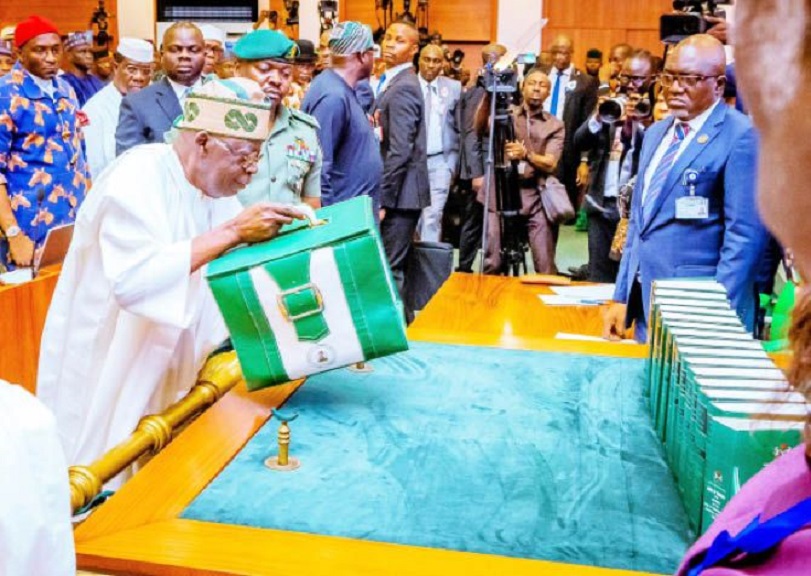Economy
FG Directs Agencies to Remit 50% of IGR, Publish Audited Financial Statements

By Modupe Gbadeyanka
The Minister of Finance and Coordinating Minister of the Economy, Mr Wale Edun, has directed all partially-funded Federal Government Owned Enterprises (FGOEs) to remit 50 per cent of their internally generated revenues (IGRs) to the federal government, while the fully-funded Ministries, Departments, and Agencies (MDAs) are to remit all their revenues.
In a circular dated December 28, 2023, the Minister said, “This is to improve revenue generation, fiscal discipline, accountability, and transparency in the management of government financial resources and the prevention of waste and inefficiencies.”
This directive is expected to be implemented by the Accountant General of the Federation (OAGF) in compliance with a presidential directive aimed at plugging leakages and shoring up revenue.
“Further to Circulars Ref. Nos. FMFBNP/OTGHERS/lGR/CRF/12/2021 dated December 20, 2021, on Revenue, Expenditure, and IGR Remittances to the Consolidated Revenue Fund (CRF), the following guidelines are hereby issued for immediate compliance by all federal government agencies and parastatals for the collections, utilisation, and remittances of IGR:
“All Ministries, Departments, and Agencies (MDAs) that are fully funded through the Annual Federal Government Budget (receiving personnel, overhead, and capital allocation) and on the schedule of the Fiscal Responsibility Act, 2007 and any addition by the Federal Ministry of Finance (FMF) should remit one hundred per cent (100%) of their IGR to the Sub-Recurrent Account, which is a sub-component of the CRF,” the circular titled Re: Implementation of the Presidential Directives on 50% Automatic Deduction from Internally Generated Revenue of Federal Government Owned Enterprises (FGOEs), read.
The disclosure further mandated the OAGF to open new Treasury Single Account (TSA) sub-accounts for all federal government agencies and parastatals listed on the schedule of the Fiscal Responsibility Act of 2007 and any additions by the Federal Ministry of Finance, except where expressly exempted.
“The new account opened for agencies and parastatals shall be credited with inflows in the old revenue collection accounts based on the new policy implementation of 50 per cent auto deduction in line with the Finance Act, 2020, and the Finance Circular, 2021, 50 per cent cost to revenue ratio,” it noted.
It added that, “The revenue collection TSA Sub-Accounts currently operated and maintained by agencies and parastatals for receiving revenue from the public shall be blocked from access.
“The accounts shall be under the full control of the Minister of Finance and Coordinating Minister of the Economy and the Accountant-General of the Federation.”
The government stressed that the Revenue and Investment Department and the Treasury Single Account Department of the OAGF must supervise, monitor, and carry out a monthly review of both the old and new accounts of the agencies and parastatals to ensure that only funds approved by the Minister of Finance and Co-ordinating Minister of the Economy (HMFCME) and the Accountant-General of the Federation (AGF) are credited to the accounts.
“Each federal government self- or partially funded agency or parastatal shall not later than three months after the end of its financial year prepare and publish its audited financial statements and management account in accordance with the prescribed rules and forward copies to the OAGF for the review and computation of operating surplus in line with the approved template of the Fiscal Responsibility Commission/OAGF.
“The remittable portion of the adjusted operating surplus will be determined and paid to the TSA Sub-Recurrent Account after reconciliation.
“The final payment to be made to the TSA Sub-Recurrent Account for the year shall, however, be the higher of 80 per cent of the adjusted operating surplus and the deducted amount from the TSA Sub-Rec Accounts of the affected agencies and parastatals,” it said.
The circular noted that, “The Federal Ministry of Finance (FMF) and OAGF will recommend appropriate disciplinary actions and sanctions against defaulting accounting officers of agencies and parastatals found culpable of violating the contents of this Finance Circular and in accordance with the Fiscal Responsibility Act.”
Economy
Flour Mills Supports 2026 Paris International Agricultural Show

By Modupe Gbadeyanka
For the second time, Flour Mills of Nigeria Plc is sponsoring the Paris International Agricultural Show (PIAS) as part of its strategies to fortify its ties with France.
The 2026 PIAS kicked off on February 21 and will end on March 1, with about 607,503 visitors, nearly 4,000 animals, and over 1,000 exhibitors in attendance last year, and this year’s programme has already shown signs of being bigger and better.
The theme for this year’s event is Generations Solution. It is to foster knowledge transfer from younger generations and structure processes through which knowledge can be harnessed to drive technological advancement within the global agricultural sector.
In his address on the inaugural day of the Nigerian Pavilion on February 23, the Managing Director for FMN Agro and Director of Strategic Engagement/Stakeholder Relations, Mr Sadiq Usman, said, “At FMN, our mission is Feeding and Enriching Lives Every Day.
“This is a mandate we have fulfilled through decades of economic shifts, rooted in a culture of deep resilience and constant innovation. We support this pavilion because FMN recognises that the next frontier of global Agribusiness lies in high-level technical exchange.
“We thank the France-Nigeria Business Council (FNBC), the organisers of the PIAS, and our fellow members of the Nigerian Pavilion – Dangote, BUA, Zenith, Access, and our partners at Creativo El Matador and Soilless Farm Lab— we are exceedingly pleased to work to showcase the true face of Nigerian commerce.”
Speaking on the invaluable nature of the relationship between Nigeria and France, and the FMN’s commitment to process and product innovation, Mr John G. Coumantaros, stated, “The France – Nigeria relationship is a valuable partnership built on a shared value agenda that fosters remarkable Intercontinental trade growth.
“Also, as an organisation with over six decades of transformational footprint in Nigeria and progressively across the African Continent, FMN has been unwaveringly committed to product and process innovation.
“Therefore, our continuous partnership with France for the success of the Paris International Agricultural Show further buttresses the thriving relationship between both countries.”
PIAS is one of the most widely attended agricultural shows, with thousands of people from across the world in attendance.
Economy
NEITI Backs Tinubu’s Executive Order 9 on Oil Revenue Remittances

By Adedapo Adesanya
Despite reservations from some quarters, the Nigeria Extractive Industries Transparency Initiative (NEITI) has praised President Bola Tinubu’s Executive Order 9, which mandates direct remittances of all government revenues from tax oil, profit oil, profit gas, and royalty oil under Production Sharing Contracts, profit sharing, and risk service contracts straight to the Federation Account.
Issued on February 13, 2026, the order aims to safeguard oil and gas revenues, curb wasteful spending, and eliminate leakages by requiring operators to pay all entitlements directly into the federation account.
NEITI executive secretary, Musa Sarkin Adar, called it “a bold step in ongoing fiscal reforms to improve financial transparency, strengthen accountability, and mobilise resources for citizens’ development,” noting that the directive aligns with Section 162 of Nigeria’s Constitution.
He noted that for 20 years, NEITI has pushed for all government revenues to flow into the Federation Account transparently, calling the move a win.
For instance, in its 2017 report titled Unremitted Funds, Economic Recovery and Oil Sector Reform, NEITI revealed that over $20 billion in due remittances had not reached the government, fueling fiscal woes and prompting high-level reforms.
Mr Adar described the order as a key milestone in Nigeria’s EITI implementation and urged amendments to align it with these reforms.
He affirmed NEITI’s role in the Petroleum Industry Act (PIA) and pledged close collaboration with stakeholders, anti-corruption bodies, and partners to sustain transparent management of Nigeria’s mineral resources.
Meanwhile, others like the Petroleum and Natural Gas Senior Staff Association of Nigeria (PENGASSAN) have kicked against the order, saying it poses a serious threat to the stability of the oil and gas industry, calling it a “direct attack” on the PIA.
Speaking at the union’s National Executive Council (NEC) meeting in Abuja on Tuesday, PENGASSAN President, Mr Festus Osifo, said provisions of the order, particularly the directive to remit 30 per cent of profit oil from Production Sharing Contracts (PSCs) directly to the Federation Account, could destabilise operations at the Nigerian National Petroleum Company (NNPC) Limited.
Mr Osifo firmly dispelled rumours of imminent protests by the union, despite widespread claims that the controversial executive order threatens the livelihoods of 10,000 senior staff workers at NNPC.
He noted, however, that the union had begun engagements with government officials, including the Presidential Implementation Committee, and expressed optimism that common ground would be reached.
Mr Osifo, who also serves as President of the Trade Union Congress (TUC), expressed concerns that diverting the 30 per cent profit oil allocation to the Federation Account Allocation Committee (FAAC), without clearly defining how the statutory management fee would be refunded to NNPC, could affect the salaries of hundreds of PENGASSAN members.
Economy
Dangote Cement Deepens Dominance, Export Activities With $1bn Sinoma Deal

By Aduragbemi Omiyale
To strengthen its domestic market dominance, drive its export activities, optimise existing operational assets and enhance production efficiency and capacity expansion, Dangote Cement Plc has sealed $1 billion strategic agreements with Sinoma International Engineering for cement projects across Africa.
The president of Dangote Industries Limited, the parent firm of Dangote Cement, Mr Aliko Dangote, disclosed that the deal reinforces the company’s long-term growth strategy and aligns with the broader aspirations of the Dangote Group’s Vision 2030.
According to him, Sinoma will construct 12 new projects and expand others for the cement organisation across Africa, helping to achieve 80 million tonnes per annum (MTPA) production capacity by 2030, while supporting the group’s overarching target of generating $100 billion in revenue within the same period.
Under the Strategic Framework Agreement, Sinoma will collaborate with Dangote Cement on the delivery of new plants, brownfield expansions, and modernisation initiatives aimed at strengthening operational performance across key markets.
The new projects include a new integrated line in Northern Nigeria with a satellite grinding unit, a new line in Ethiopia and other projects in Zambia/Zimbabwe, Tanzania, Sierra Leone and Cameroon. In Nigeria, Sinoma will also handle different projects in Itori, Apapa, Lekki, Port Harcourt and Onne.
The projects signal Dangote Cement’s sustained commitment to consolidating its leadership position within the African cement industry, while enhancing its competitiveness on the global stage.
Chairman of the Dangote Cement board, Mr Emmanuel Ikazoboh, during the agreement signing event in Lagos, explained that the new projects would enable the company to play a critical role in actualising Dangote Group’s Vision 2030.
The new projects, when completed, will increase Dangote Cement’s capacity and dominant position in Africa’s cement industry.
On his part, the Managing Director of Dangote Cement, Mr Arvind Pathak, said the agreement reflects the company’s determination to grow its investments across African markets to close supply gaps and support the continent’s infrastructural ambitions.
According to him, Dangote Cement is committed to making Africa fully self‑sufficient in cement production, creating more value and linkages, leading to increased economic activities and a reduction in unemployment.
-

 Feature/OPED6 years ago
Feature/OPED6 years agoDavos was Different this year
-
Travel/Tourism10 years ago
Lagos Seals Western Lodge Hotel In Ikorodu
-

 Showbiz3 years ago
Showbiz3 years agoEstranged Lover Releases Videos of Empress Njamah Bathing
-

 Banking8 years ago
Banking8 years agoSort Codes of GTBank Branches in Nigeria
-

 Economy3 years ago
Economy3 years agoSubsidy Removal: CNG at N130 Per Litre Cheaper Than Petrol—IPMAN
-

 Banking3 years ago
Banking3 years agoSort Codes of UBA Branches in Nigeria
-

 Banking3 years ago
Banking3 years agoFirst Bank Announces Planned Downtime
-

 Sports3 years ago
Sports3 years agoHighest Paid Nigerian Footballer – How Much Do Nigerian Footballers Earn



















